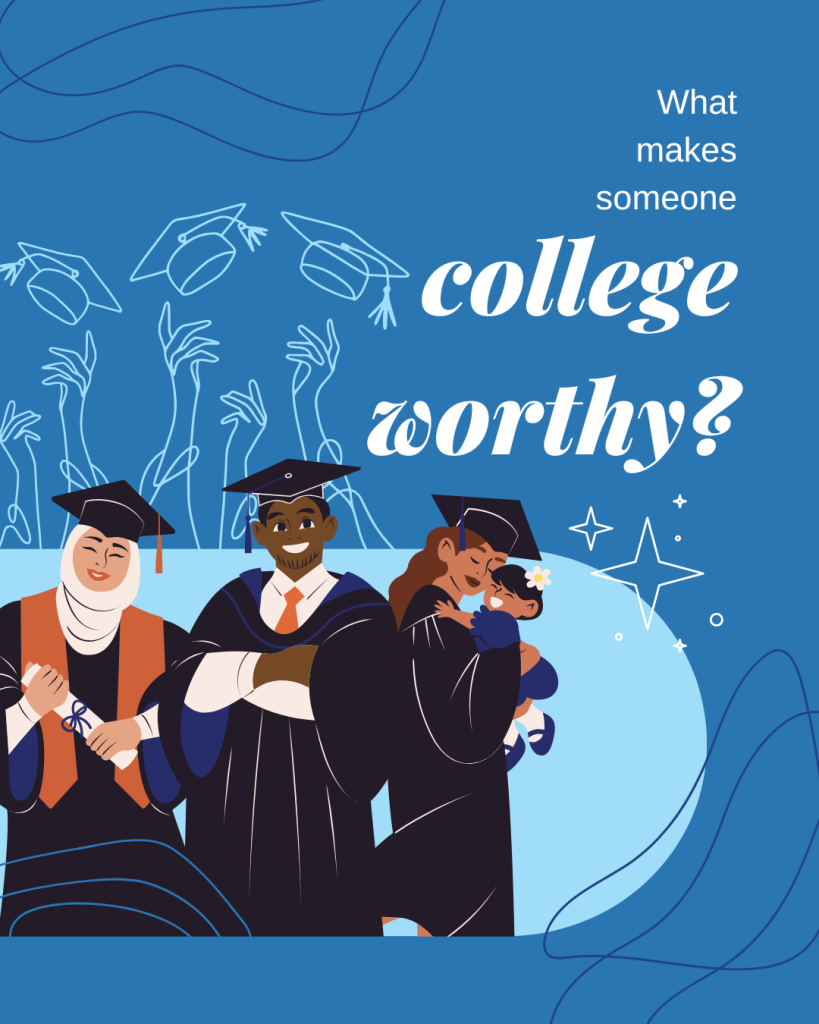Aspen University’s Mission states that “Aspen is dedicated to offering any motivated college-worthy student the opportunity to receive a high-quality, responsibly priced distance-learning education for the purpose of achieving sustainable economic and social benefits for themselves and their families.”
The phrase “college-worthy” might sound exclusive. For many, it brings up images of high grades, long lists of extracurriculars, or a specific type of student who follows a traditional path straight from high school to university. In reality, being college-worthy is not about fitting a stereotype. It is about motivation, determination, and the desire to build a better future for yourself and your family.
 |
Defining College-WorthinessAt its core, college-worthiness means being ready and willing to learn. It does not mean you have to come from a specific background, earn straight A’s, or be wealthy before enrolling. Higher education is most valuable when it is accessible to people from all walks of life. A motivated learner who is determined to improve their life is every bit as college-worthy as a high school valedictorian. |
Breaking Down Barriers
The United States Department of Education estimated that 73% of all undergraduates in the US attending accredited institutions in 1999–2000 had one or more nontraditional characteristics, and this statistic has remained steady since then. According to the National Center for Education Statistics, the majority of today’s undergraduates are considered “nontraditional,” meaning they may work full time, support dependents, or return to school after years away. These students often juggle multiple responsibilities that traditional college systems were not originally designed to accommodate. Unfortunately, this means that many students who are highly motivated face barriers that prevent them from pursuing college. These barriers can be financial, social, or personal.
Still, their motivation is undeniable. Adults returning to school often do so because they want to secure stable employment, serve as role models for their children, or open new doors for career growth. Their drive proves that motivation, not a picture-perfect path, is what makes someone ready for higher education.
 |
Nontraditional Students Are College-WorthyConsider the single parent working full time, then studying late into the night. Or the mid-career professional who decides to pursue a degree to change industries. Or the grandparent who returns to school decades after their first try. Or the experienced RN who is suddenly required to earn a bachelor’s degree by their employer. Each of these learners is college-worthy because of their commitment to growth. |
Research supports the idea that nontraditional students succeed when given access and support. According to the American Council on Education, adult learners benefit most from flexible formats such as online learning, competency-based education, and financial aid structures that recognize their unique needs. These adjustments help ensure that education is not just for the privileged few, but for anyone who is motivated to pursue it.
Education as a Right, Not a Privilege
Higher education is not simply a reward for previous academic achievement. It is also a tool for empowerment. The Lumina Foundation emphasizes that broadening participation in higher education is essential to building stronger economies and fairer societies. When opportunities are limited to only certain groups, talent and potential go untapped. When opportunities are extended to everyone with the will to learn, society as a whole benefits. Studies show that adults who earn degrees increase their earning potential, improve their health outcomes, and contribute to stronger, more resilient communities.
The Role of Institutions
Institutions play a major role in breaking down barriers to college access. At Aspen University, the mission is clear: any motivated student who is college-worthy should be able to pursue a high quality, responsibly priced education. This means setting tuition at levels that reduce or eliminate the need for student debt. It also means designing programs that are flexible and relevant, preparing learners to become lifelong contributors in their families, workplaces, and communities.
 |
This aligns with a larger movement in higher education to define success not by exclusion, but by inclusion. Colleges are increasingly called to serve a diverse population of learners, ensuring that the classroom reflects the world outside it. |
Why Motivation Matters Most
Grades and test scores provide one snapshot of a student’s past, but they do not capture future potential. Motivation, on the other hand, reflects a student’s readiness to engage with education in a meaningful way. A student who is willing to work hard, learn new skills, and persevere through challenges is every bit as deserving of higher education as a student with a perfect transcript.
Being college-worthy means being ready to take the next step toward personal and professional growth. Whether you are a recent high school graduate, a parent balancing family and work, or an adult seeking a second chance, your motivation makes you worthy of the opportunity to pursue a degree.

College-worthiness should never be about gatekeeping. It is about honoring the drive within each learner to improve their life and contribute to society. At Aspen University, and at any institution committed to equity, the doors of education remain open to all motivated learners. After all, the desire to learn is the truest sign that someone is college-worthy. Do you have that desire to learn? Explore our programs and apply today!
Sources
Dunn, T. (2025, January 16). When the exception becomes the norm: The rise of nontraditional students in higher education. Manhattan Institute. https://manhattan.institute/article/rise-of-nontraditional-students-in-higher-education
Zajacova, A., & Lawrence, E. M. (2018). The Relationship Between Education and Health: Reducing Disparities Through a Contextual Approach. Annual review of public health, 39, 273–289. https://doi.org/10.1146/annurev-publhealth-031816-044628

